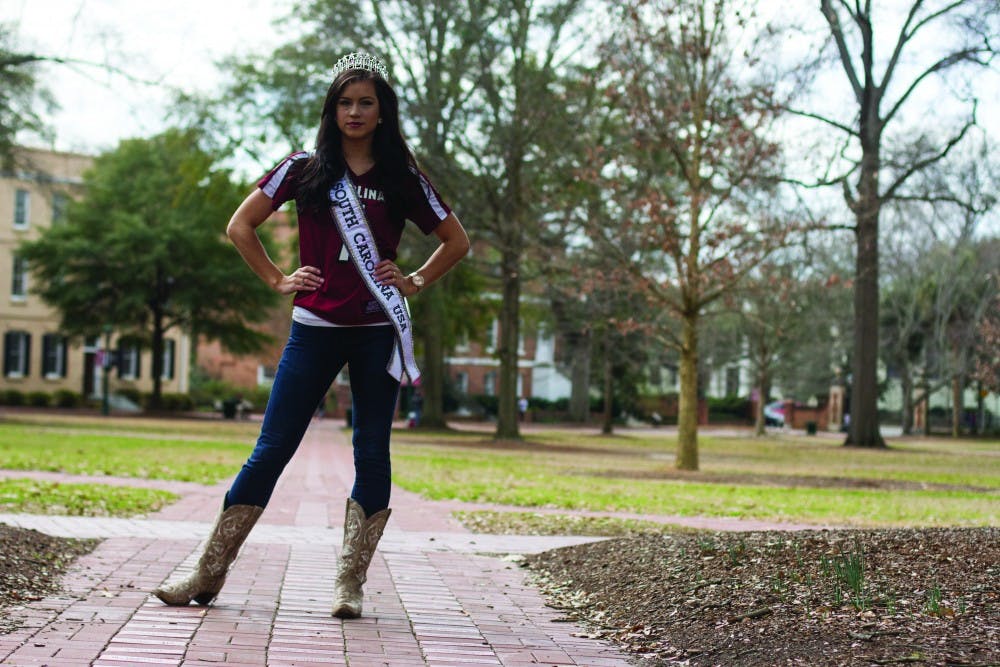During the interview portion of the most recent Miss Universe pageant, judge Rob Dyrdek posed this seemingly innocuous question to then-Miss Colombia. Though she went on to win the pageant, Colombia’s answer was decidedly evasive, and many viewers around the globe found themselves wondering how they would have chosen to answer Dyrdek’s question. Sarah Weishuhn knew immediately what she would have answered, but then again, she’s Miss South Carolina USA 2015.
Weishuhn arrived early to campus for our interview, jingling with an armful of bracelets. The 23-year-old queen is right at home at USC; she only just left campus in December after finishing a B.A. in public health and still works in Columbia between her obligations as a titleholder. Truthfully, it’s easier to imagine her here than it is on stage, a thought that she echoes, saying, “Wesley and I would both rather just hang out in our sweats and watch Netflix.”
That’s Wesley Mitchell, Miss South Carolina Teen USA and Weishuhn’s “Sister Queen” (a term they affectionately call each other). Mitchell, a current freshman at USC, is so similar to Weishuhn that it’s hard to believe they had never met before being crowned. Not only are they both wildly hilarious and down-to-earth, but also neither of them had been involved in pageants in their early years. In fact, winning Miss SC Teen was Mitchell’s first jump into the world of competitive pageants.
Weishuhn, though, had competed at Miss SC USA twice before, and at the 2014 pageant, she placed first-runner-up, a position of high stress in this state.
“They call it the curse, the first-runner-up curse,” Weishuhn says with a gentle eye roll, “and I’m the first one to come back and win in almost ten years.” She and Mitchell both do this a lot, at least in our brief conversations: downplaying their accomplishments like anyone could have won the crown.
Maybe it’s because of the stigma that comes with competing in pageants. Shows like TLC’s “Here Comes Honey Boo Boo” or Lifetime’s “Kim of Queens”—not to mention the dozens of articles spouting off “facts” about the damaging effects of pageants on the self-esteem of young women—force a negative opinion from the public. Sure, I could argue all day my opinion on “Toddlers and Tiaras”—it’s not a favorable one—but shouldn’t we agree that women can make their own choices? This unfavorable attitude can even carry over into the competitions themselves. Weishuhn remembers, “One of the judges this year asked me why I would want to be a part of something that was derogatory to women [where] we flaunt around in our swimsuits and just seem to be pretty… and I just said well, ‘that’s not how it is.’”
If a woman, on her own accord, chooses to walk on stage wearing only a swimsuit, should she be victimized? The Miss USA pageants in particular get a bad reputation because, unlike their competitor Miss America, there is no talent portion or scholarships awarded to winners. The common misconception is that Miss USA is beautiful and Miss America is smart. It’s true that the Miss America organization claims they provide the most scholarships for women nationwide, and yes, Miss USA did originate as a swimsuit competition—but it’s not quite so categorical. To start with, Miss USA and Miss USA Teen are salaried positions, and the women are given an apartment in New York City, not to mention the wealth of opportunities that are afforded when your boss is Donald Trump. National winners are offered modeling contracts, jobs in entertainment and fashion and the opportunity to meet all types of people in high-level careers. They travel around the country doing philanthropic work and promoting their platforms, which often advocate for young women. Former Miss USA titleholders have been accountants (Erin Brady), two-time All-American athletes (Nana Meriwether) and entrepreneurs (Crystle Stewart). Weishuhn is working toward getting her master’s in dietetics, and Mitchell plans on graduating with a business degree.
All of this, and yet there are still critics who say that pageants are for girls with no brains, no talent and no motivation. Weishuhn says, “Usually I don’t tell people I’m a pageant girl—I’m Miss South Carolina—because I just want them to know me. That’s not my whole life. There’s me, and then there’s my pageant life.” Mitchell agrees, echoing the desire not to be seen as just one part of a whole person. Let’s be clear though: neither would trade her crown in for anything, and each is deep in preparations for their respective national pageants in June and August. This means looking for the perfect evening gown, working on answers to sample questions for the interview and maintaining a healthy lifestyle for—yes—the swimsuit competition.
As a future dietician and advocate for living a healthy life, Weishuhn is too aware that she has to take special care with how she looks. “My whole platform is being healthy,” she says. “My goal is to be in the best shape for my body for Miss USA – not to be too skinny, underweight or anything. I’m not going to risk putting myself in an unhealthy position, even for my dream.” She and Mitchell both know the impression that they have on young girls across South Carolina, and that winning at any cost isn’t worth their positions as role models. Mitchell wants to inspire confidence in all young girls, saying, “When you’re confident and embrace yourself, you have power.”
So what could women learn from men? Weishuhn smiles. “I don’t think there is anything I could learn from a man that I couldn’t also learn from a woman.” Well said.



